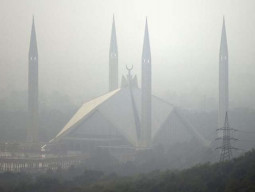Pakistan was cited among 10 countries “failing to sufficiently protect religious rights”, in a report regarding religious freedom released by Washington on Wednesday.
The other countries, mentioned in the US State Department’s International Religious Freedom report for the second half of 2010, included Afghanistan, Egypt, Iraq, Nigeria, Russia, Tajikistan, Turkmenistan, Venezuela and Vietnam.
However, Pakistan was not included in the list of ‘countries of particular concern’ regarding religious freedom – much to the dismay of the US Commission on International Religious Freedom (USCIRF). The list named China, Saudi Arabia, Myanmar, North Korea, Eritrea, Iran, Sudan and Uzbekistan.
“… the current list continues with glaring omissions, such as Pakistan and Vietnam. We respectfully urge Secretary Clinton to consider the six additional countries we recommended for designation,” said USCIRF Chair Leonard Leo.
The report details actions such as active state repression, violence against religious groups, apostasy and blasphemy laws, anti-Semitism and restrictions on religious attire and expression.
The report bluntly states that the constitution and laws in Pakistan “restricted religious freedom and, in practice, the government enforced these restrictions.”
Citing acts of violence against religious minorities as well as societal and governmental discrimination, it states that “the government rarely investigated or prosecuted the perpetrators of increased extremist attacks on minorities and the majority promoting tolerance, which deepened the climate of impunity.”
The report includes a long list of case studies of violence and discrimination against Ahmadis, Christians, Sikhs, Hindus and other Muslim sects.
The controversial blasphemy law, Aasia Bibi’s case in particular, and discrimination against the Ahmadiyya community take centre stage in the 30 pages of the report dedicated solely to Pakistan. “The government did not undertake reform measures to prevent the abuse of the blasphemy laws.
Toward the end of the reporting period the public discourse regarding the blasphemy laws became increasingly heated, which contributed to the government’s reluctance to address the issue. For example, after initially signalling he was considering pardoning Aasia Bibi’s death penalty sentence for alleged blasphemy, President Zardari refrained from doing so,” the report states.
It adds that the government, in fact, distanced itself from a bill introduced by a member of the ruling party that would have amended the blasphemy laws to prevent abuse.
Terming the blasphemy laws “a legal weapon against religious minorities and other Muslims”, the report says that the government’s failure in addressing religious hostility fostered intolerance and acts of violence against minorities and Muslims alike.
However, the report gives credit to the slain minorities minister Shahbaz Bhatti for promoting religious tolerance and taking an active role in assisting victims of religiously motivated attacks on Christians and Ahmadis.
The report states that, according to the National Commission for Justice and Peace (NCJP), between 1987 and 2010, a total of 1,068 persons were charged under the blasphemy laws. In 2010, blasphemy complaints were registered with the police against 17 Christians, eight Muslims, five Ahmadis, and seven Hindus, according to the report.
(ADDITIONAL INPUT FROM AFP)
Published in The Express Tribune, September 15th, 2011.
COMMENTS (26)
Comments are moderated and generally will be posted if they are on-topic and not abusive.
For more information, please see our Comments FAQ


1731550446-0/Polymarket-(1)1731550446-0-165x106.webp)

1729512368-0/liam-(8)1729512368-0-165x106.webp)












Why is France not on the list?
if the people see open display of hatred and zulm , and even fail to acknowledge that it exists,how would they ever do anything to improve it.it is not far when pakistan will be at an 'enviable' position of number 1 in the world; number 10 is not satisfactory to these people
@Ovais Brother Ovais, don't be so naive. Telling people that Ahmadis are 'wajibulqatal' and killing them is a way t achieve Jannat. Then publishing the addresses of the Ahmadis to be targeted and adding their own address to show how they are the sole protectors of the honor of the Prophet. Is it not what killing is? Since you talk a lot about the constitution. Please tell me is it not a major culpable crime, under the constitution of Pakistan, to incite people to kill others? If you say that killing means actually shooting with a bullet or stabbing with a knife then don't you believe incitement to kill an innocent person is 'fitna'. According to the Quran 'Fitna is worse than killing'. As regards your abhorance to rape, I am with you and people should stand up against this heinous crime. But would you condone killing of the minorities in Pakistan because there are rapes committed by evil doers in Pakistan. My suggestion to you is that as a concerned citizen of Pakistan please stand up against both these, in fact against all, crimes. Be brave and trust in God. I do not know how many rapes are committed because I do not live in Pakistan. But you have my support from 10000 miles away. Call a spade a spade. Tell the Mullahs of Majlis Tahuffaz Khatam e Nubuwwat that you are against them in their illegal activities. Write in all the newspapers, English and urdu, about minority persecution and rape. Best wishes.
@AA Choudhary
Terrorist threat these minorities not Pakistanis if they discriminate then why do we care . I don't really get the love for ahmadi's here , 2000 ppl die in karachi , Daily 2 -3 gangrapes happen , karo kari is there but we are only going to talk about minorities , Its unfair journalism
@ Ovais Irrespect of the percentage of coverage or ownership by any institution, Mr Ovais should feel proud of having a newspaper that stands to support the rights of an under-privileged section of the society. Mr Ovais, say Bravo to ET. Additionally you should encourage Urdu media to side with the just cause. I have never seen any effort by Jang, Sadaqat or Nawai Waqat to express concern on the persecution of Ahmadis in Pakistan. Your ctiticism should be directed at them.
@ Ovais - ET just wants Pakistanis to know the truth. Sadly you are one of those people who cannot see anything positive done for minorities. 99% of Pakistan's papers don't give any voice to minorities but you find it necessary to criticize the 1% that do. What did you do for the child that was raped? Please enlighten me.
@ All those complaining about America - give me a break. I live here. We are free to practice our religion here. You can go to the mosque in America without fear of being blown up as my relatives do every day all over Pakistan. You just hear a few isolated stories in the news about discrimination in America but Americans are very open and warm people. If you had a visa, you'd be here too so stop your hypocrisy.
This is a conspiracy!! Everybody pakistani is free to practice islam. See? we dont discriminate.
@unknown I live in America and the comments by 'unknown' about USA are extreme exceptions rather than the rule. Also whenever such crimes have occurred the poilice, the Justice dept and FBI go after the miscreants. Many politicians condemn the actions. The tolerance of the American society is superb. I say so from my personal eperience. I frequently deliver lectures on Islam in public places. I have been doing it for almost six years and nobody, none, ever has mistreated me. I wish Muslims of country's such as Pakistan, Indonesia, Bangla Desh learn from the tolerance shown to Islam and Muslims in general by these people whom the misguided Mullahs never tire calling infidels.
@Umair This means to tackle Taliban suicide bombers is a religious discrimination because they believe this is their religious duty.Et and its love for minority ... what about that 14 year who got raped and committed suicide we are not following human rights .. let alone be minority
So where does the "surprise" part come in?
@Fghafoor: If that was the case you should not be able to build mosques.. you should not even be moving to USA, but i can gurantee you that each and everyone living in Pakistan wants to move to USA.. meaning there are rights over there otherwise you would not even think about moving to a country where there are no rights. For example i don't think if you(if you are woman) or your wife or daughter/sister wears a hijab and you are trying your best to move to France just because you like it.. So no Pakistan does not give any rights to minorities. Did you forget about the hindu kid who drank water from outside the mosque last year and who hindu community was burnt, if a cleric doesn't like anyone or wants to "SHOW HIS LOVE FOR ALLAH" all he does is use blashemy law, there should be consequences for using such laws that if proven wrong the person will be hanged instead or something.. but consequences are important. So wake up, we have already lost half pakistan because we thought we are not discriminating bangalis, now don't loose everything while you are having your sweet dreams.
Very wrong report. Correct report is that Pakistan is one of those countries who can not guarantee safety to life and property of any citizen of the country, what to say of minority. Report and class of my country is requested to be changed accordingly.
Typical liberal hogwash posted here, who are using minority rights as a gibe to further their perverse agenda which includes third-class secularism.
@UMAIR:
If France is to be on top for disallowing a piece of cloth, the where should Pakistan be for liberal declaration of minorities as "wajib-ul-qatl" and government conveniently looking the other way?
Or is it that, only the rights of believers matter to you?
In Pakistan even Majorities have no rights - Those who are in POWER (read: government) have all kinds of rights.
Pakistan was cited among 10 countries “failing to sufficiently protect religious rights”,
then France must be on TOP??
WE often here from our leaders that Quran is best guide for us. But they always forget a clear guidline from Quran LA IKRAHA FE ALDEEN I think those who ignore this are liable of being charged under Nammos e QuranShme on the politicians who fail to pass any bill in the parliament favouring minorities
What about America, where indiscriminate treatment is meted out to minorities (Muslims) especially after 9/11 attacks, where absolute religious freedom is not enjoyed by Muslims and head scarves snatched from female Muslims and they are called terrorists and where non-Muslims commit blasphemy against Holy Prophet Muhammad Peace Be Upon Him and hurt their sentiments.
And what about Denmark which publishes blasphemous cartoons disrespecting the Holy Prophet Muhammad (PBUH) of Muslims.
Similarly, what about France, which imposed ban on headscarf.
Are Muslims enjoying religious freedom in these countries. Absolutely No!
Pakistan has not imposed ban on any religious activity of non-Muslims in the country. The report is biased.
US Govt always stated that they are our best friends and on the other side their agencies are paying & pushing Media to write and proof Pakistan as a failed country.
We have point out some of the eye opening points and opportunities for our own improvement too.
Let me Answer the US State Dept. come and see your self how close we are with each others. no doubt there might be few cases but that can't be based of the reports.
On the other side just visit your own towns in your own country (US state dept.) Every Muslims (Your own citizens) are treated like they have supported your own planed 9/11. Few of my Friends and people know to me are US citizens, they are scared as hell there in New Jersey & in New York.
Common USA open your own eyes before pointing to some one else.
I would like to invited US State Dept for a debate with on the same issue with ground realities and fact with proves.
Mr. Shayan Naveed and Express Tribune Team pls pass on this message to US state dept.
very true . Quaid e Azam said this is a state of many Different Religions & people all living together in Unity.
But there is NO peace for the Monorities.
No Freedom at all
This Govt has Failed in all aspects